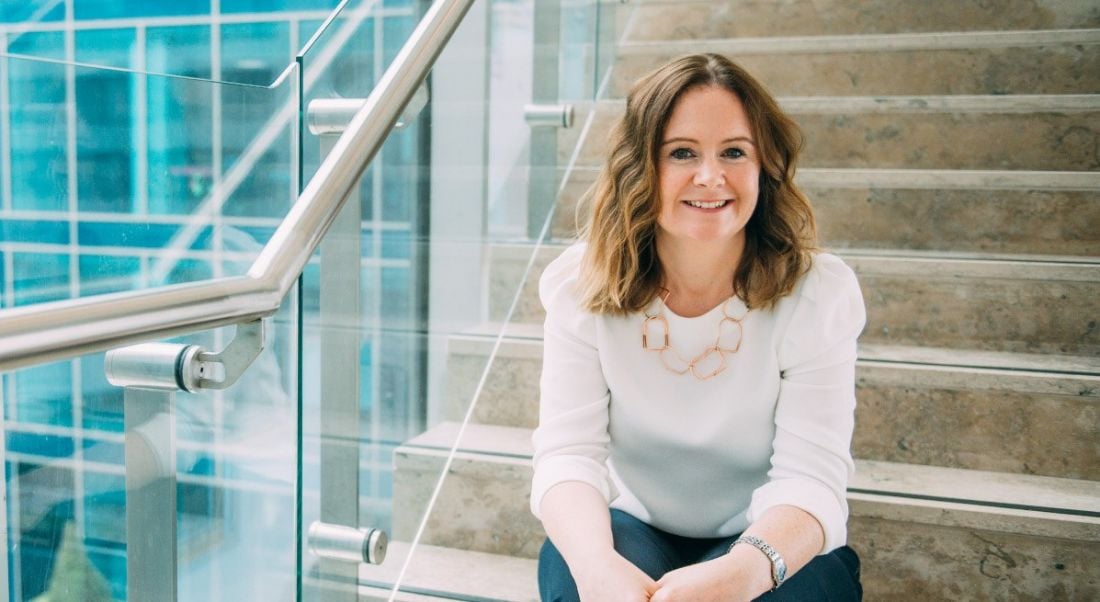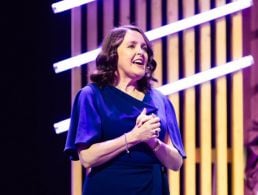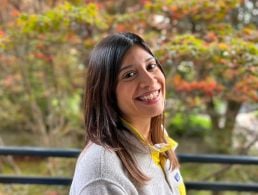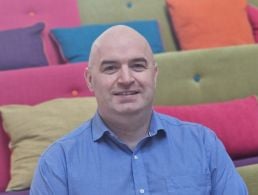Dr Alice Kirby has had a career journey like no other, and she’s using every experience to drive her desire to improve healthcare.
Accounting, e-commerce, financial services, tailoring, goldsmithing, medical devices and volunteering in a Zambian hospital. Suffice it to say that Dr Alice Kirby has had a varied career.
These days, she finds herself as health and life sciences innovation lead at The Dock, Accenture’s multidisciplinary research and incubation hub in Dublin’s docklands. She told us how her multifaceted background and myriad experiences help her to contribute to the development of technological solutions to improve healthcare.
‘I haven’t climbed one straight ladder, I have climbed one for a bit then switched to another one and had to start again’
– DR ALICE KIRBY
What first stirred your interest in a career in this area?
I can’t claim my career was a well-thought-out plan. My first job was more than 20 years ago and I have rarely done the same thing for very long.
I started in fund accounting, then moved to e-commerce just in time for the tech bubble burst. I worked in service and product development for financial services for 10 years, with a gap in the middle to train as a tailor and goldsmith while I ran my own design business.
The economic crash prompted a shift out of banking, which led to a volunteering stint in a Zambian hospital. I saw surgery for the first time and was mesmerised. I started working on medical charity funding applications, which very quickly snowballed into me going to medical school. I enjoyed helping people feel better and being a doctor is the best job in the world on the good days. Sadly, the healthcare system is under too much pressure and I found it too frustrating to be relentlessly battling the inefficiencies.
I left clinical practice to participate in BioInnovate, a Stanford BioDesign affiliate that is an Enterprise Ireland-funded fellowship in NUI Galway for medical device design. As part of the fellowship, I spent time in the Mayo Clinic in Minnesota where I met the amazing Lorna Ross. When she moved to be group director of Fjord at The Dock, I had to find out what the place was about.
I have been here since last summer and my head is still spinning with all the fascinating projects we have going on here. Currently, I’m developing technology and solutions for our healthcare clients.
What education or other jobs led you to the role you now have?
It has been my approach to opportunities that has led me to this position rather than a specific course or previous job. The book The 100-Year Life by Lynda Gratton and Andrew Scott from London Business School is an interesting viewpoint. They cover a range of topics, such as the economic impact of longevity, but, essentially, it’s about how we need to change our approach to life as we live longer. People pick a university course at 18 and by 30 they feel they are too old to change and they get stuck.
Learning anything new will always be of value even if that value is not immediately apparent. I have studied pattern drafting, which is how to plan a multidimensional piece from flat fabric. Figuring out how to suture a wound or building a virtual-reality room require very similar spatial relations skills. Spotting mistakes in the terms and conditions on financial products builds an attention to detail that helps when you’re asking patients about their illness. I am probably where I am now from constantly trying new paths while taking the previous knowledge with me.
What were the biggest surprises or challenges you encountered on your career path?
I haven’t climbed one straight ladder, I have climbed one for a bit then switched to another one and had to start again. While this can feel a bit like Snakes and Ladders, I am constantly building and expanding my knowledge, experiences and network. I have been guided by great people who have taught me so much, and encouraged me to be brave and take calculated risks.
Recently, I read about sisu, the Finnish concept of grit, resilience, determination, bravery and willpower. It’s the ‘one foot in front of the other’ approach to keep going at keeping going. There will be challenges on any path less travelled but it’s worth the effort.
Was there any one person who was particularly influential as your career developed?
All along the way, I have met such impressive people. I have such huge respect for my former colleagues who battle on the frontline in hospitals every day. I have faith that technology will positively impact healthcare but it is not there yet. And, of course, the unwavering support of my family is a huge part of my success to date.
What do you enjoy about your job at Accenture?
The type of people and the way we work in The Dock is unusual. We will have a designer in a room with an AI expert and a software engineer and then I join in with a healthcare industry view, all to solve a client problem.
I get to work with incredibly bright people and I am learning so much. In the last week alone, I have had the chance to participate in projects around quantum computing, Li-Fi, generative adversarial networks and computer vision. Together, we are building solutions that will have a positive impact on the lives of patients, their families and the hospital staff looking after them.
What aspects of your personality do you feel make you suited to this job?
I always try to be kind, friendly and respectful. It is important to believe in yourself but, at the same time, we have so much more left to learn from others.
I highly value listening. Listening and not interrupting is something we should teach children in school. To solve client problems, we need to build understanding and you cannot do that without respectfully listening.
I’m in no way competitive whatsoever and I’m unsure if this helps or hinders me.
What’s next for the medtech sector?
It is such an exciting time to be in medtech in Ireland. We are so lucky to have a strong selection of multinationals here in addition to our homegrown entrepreneurial talent. BioInnovate is a great asset. The Enterprise Ireland commercialisation funding is the vital foundation that investors can then build on. Having the Irish Medtech Association as community support is the glue bringing us altogether.
There is massive opportunity around what I see as the disconnect between device and data. Data companies are moving into the device space and the device companies are beginning to embrace data, but there are still big gaps. There are some exciting collaborations such as Google and Johnson & Johnson working on surgical robotics but this is just the start of it. The next wave of innovation will be around harnessing data insights to create innovation in devices.
If you are a healthcare company, then being data-driven is no longer optional. The most advanced technology is useless if you cannot get it to patients. Investment in system integration is key.
What advice would you give to those considering a career in this area, or just starting out in one?
If you feel you are the smartest person in the room, then you are in the wrong room. Or, alternatively, you are underestimating the other people in the room. Always engage with the people you meet and listen. Never stop learning. Dump preconceptions about who you can learn from. You can know what you know with confidence while always being open to conflicting opinions that are often a source of new insights.
Being practical, everyone should read Designing Your Life by Bill Burnett and Dave Evans from Stanford. They outline how to ‘prototype your life’, which I think is such a great idea.
Basically, it means go out and try things: volunteer, do an internship, join a meet-up group. There are so many options now that did not exist previously. I volunteered for a nameless company that I thought would be a dream job but it wasn’t. It was great to learn in a month that it was not the right path for me.
Engage with any of those groups that I mentioned. Alternatively, gather a team and develop a solution and then build a company. Just do it.
I certainly cannot suggest that I have it all figured out and I have no idea what is ahead of me. I think it’s always good to understand yourself and your skills. I know I want to make changes that improve healthcare. Try to be honest and coach yourself. Figure out what you want to do, then get started on the work to make it happen.




